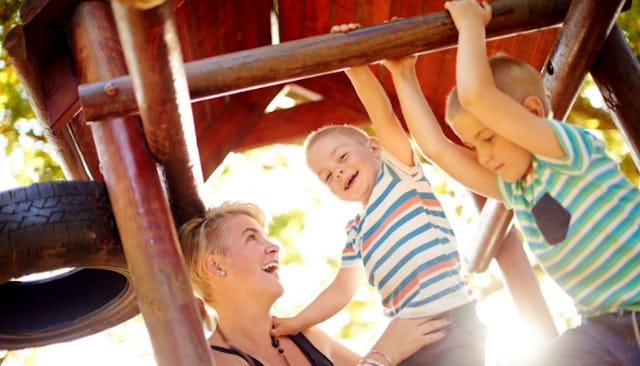Why I Want You To Call My Kids Out On Their Bad Behavior

I grew up in the ’80s and early ’90s when life was a tad different. There were no cell phones (not to mention tracking devices); most of the time my parents did not know where I was; I had never heard the term “helicopter parenting”; and it was not unusual for a shop owner, another parent, or some random adult to tell us kids to straighten up and fly right when we were being assholes. They sure as hell never apologized to my parents for it either. For the most part, we all listened. I do believe it is what kept us from making more bad decisions. Well, some of us anyway.
A few years ago a woman at the park came up to me and apologized because she had to discipline my son. She said he was pushing her daughter and she had to tell him to stop, and she felt horrible about it. “You were busy with your daughter. It was when she fell and was crying by the swings.”
I thanked her and told her she was helping me out. She didn’t need to be sorry. I needed to be sorry. But more importantly, my son needed to be sorry, and he was. Would he have been sorry if this stranger had just picked up her daughter and left without saying anything to him? No, not at all. He probably would have thought, Hey, look at me! I am doing something wrong and nobody is stopping me. I am going to try that again!
I think most parents would agree that if they are standing right there and you are trying to discipline their child, there is going to be a problem. We don’t need to overparent the parents, but I believe there is a time and a place to speak up. There is also a respectable way to go about this, which does not involve screaming in a child’s face.
If I see a kid (I don’t care if they are 3 or 17) doing something to hurt themselves, hurt others, or they are just being an asshole, I am going to say something to them. And I expect the same from other adults. So please, if my child is disrespecting you, you can say something to him about that. If my child is being rude to your child, be my guest, make him apologize. If my child is pissing on your lawn, by all means, you can yell at him.
When I hear the phrase “it takes a village to raise our kids,” I could not agree more. And as our children get older, I think more than one village may be necessary. If kids know that other adults are watching, if other adults are paying attention, they will be more aware of their words and actions. I know I certainly was. Sometimes different people can teach us different things, and I have no problem with my kids experiencing that. I want them to grow up to respect others and be aware of the consequences of their behavior. How can that happen if nobody dares to say anything at the risk of offending the parents?
I don’t care how good your child is—at one time or another, they will try on their dickweed pants, and you might not be there to see it. But if you are lucky, other adults will, and if you are really lucky, they will call your kid on it. Of course, trying on those dickweed pants doesn’t mean your kid is a dickweed—good kids make bad decisions too. But hopefully, they will be very embarrassed if they get caught, and maybe that will keep them from making the same mistake in the future.
So if I see a child about to make a very bad decision, I will say something. If I see a child hurting someone else or themselves, I will say something. But if I simply see them doing something I don’t like or agree with, I will keep my mouth shut and mind my own business because I am not a dickweed. Fortunately, a few times when I tried my dickweed pants on when my parents weren’t around, there were some random adults who actually gave a shit and set me straight.
This article was originally published on